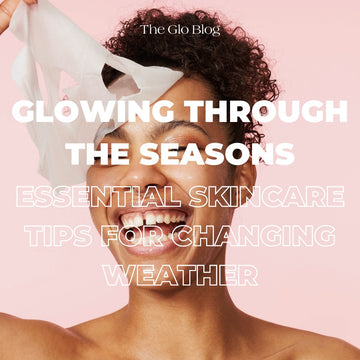Do you feel like you are losing your glow? You are not alone!
The seasons have an effect on our skin and the importance of a good skincare routine during seasonal changes is often overlooked. Seasonal changes can make us feel like we are losing our glow. As each new season emerges you may notice that your skin can look and feel different.
Winter, Spring, Summer, Autumn come with different weather patterns. Temperature and humidity effect the skin barrier and the balance of your skin. Cold weather, sunshine, air conditioning and central heating can harm our skin, which is highly sensitive to climate change. During the intermediate seasons, with their topsy-turvy weather, our skin has to work harder to adapt.
Do you see a sudden change in your skin as the winter weather creeps in?
Your skin is doing its best to stay hydrated in winter when there is less moisture in the air and harsher conditions. Our skin is exposed to wind and cold conditions and can look less radiant. Our skins metabolism slows down and so does skin renewal and skin can loose its healthy glow.
It becomes more challenging for the skin to maintain moisture levels. The methods we use to stay warm are not helping either, hot showers, heaters can cause dryness and irritation to the skin and make our skin look dull and less radiant.
This dryness leads up to a build of dry skin, which can clog your pores and cause the skin to break out or flare up. Comfort eating during winter can also upset the hormonal balance of the skin. It’s not just the temperature changes that contribute to winter acne and irritation. As the seasons shift. Warmer showers and running the heat in your home can further zap your skin of moisture, which can lead to winter acne – it’s important not to forget those hard-to-reach places that produce lots of oil like your upper back.
How to bring your glow back in winter?
- Double cleanse twice daily, a non-negotiable during winter.
- Exfoliate the dirt and dead skin cells once a week, this step makes sure skin care products can penetrate.
- Choose a chemical exfoliant that is less abrasive and more friendly to the skin than a granular exfoliator and that does not disrupt the skins barrier.
- Mist to keep the skin hydrated.
- A hydrating serum daily to achieve intense hydration.
- Moisturise twice daily with a hydrating moisturiser to keep your skin hydrated, make it soft, supple and healthy, also maintain the skin’s natural barrier.
- Lip balm. Sunscreen daily to protect the skin against UV.
- Nourishing/ Hydrating sheet mask with active ingredients that penetrate deep into the skin.
Your skins best friend is a healthy skin barrier!
Lets start with the health of your skin barrier. A robust skin barrier is the cornerstone of skin health. The weather can change the PH of your skin and as we go into winter the skin barrier becomes compromised. The skin barrier helps defend us from harmful irritants and external aggressors. This moisture barrier protects against pollution, UV and irritants.
When your barrier is compromised or thin it allows irritants in more easily. When our skin is no longer protected by our barrier, blemishes return with a vengeance: wrinkles, dry skin, redness and in some cases an increase in oil production.
Signs that your skin barrier is damaged and how to repair it?
The signs are increased sensitivity, dryness, dehydration, flakiness, redness and irritation. If you have a damaged skin barrier it can take up to three or four months to start seeing the benefits of your efforts. The skin barrier is the outer most layer of the skin and your skins first layer of defence also know as the stratum corneum (horny layer). To repair your barrier, use lukewarm water, a mild cleanser, do not use abrasive scrubs, use fragrance free skincare products, don’t over do it with
AHA and retinol.
So what can you do to keep your skin glowing during the warmer months?
As the weather starts warming up in spring oily skin might begin to feel more oily and congested as the dead dry skin cells trap the oil. Warmer weather stimulates the oil glands and can open pores and allow more impurities in. Skin hydration on the cheek area can also decrease due to sweat evaporation. This can cause breakouts and flareups.
The skin still needs to stay hydrated but its better to hydrate the skin by drinking more water. With more oil production applying moisturisers, sunblock and make up you could start noticing underlying congestion and break outs. To keep the skin bright and glowing we need to remove the dead skin cells. Keep your skin hydrated, for an oily skin stick to your light moisturiser, your skin might over produce sebum in warmer weather.
Dry skin can be sapped of moisture leaving the skin tight and dry. This can be caused by sun exposure. For dry skin use products with ingredients like Hyaluronic Acid, Avocado Oil and Niacinamide these will protect your skin against the environment by retaining hydration.
How to bring your glow back in summer?
- Double cleanse with a hydrating cleanser.
- Mist with a hydrating mist. Hot weather opens the pores and a mist will refine your pores and
- hydrate your skin.
- Moisturise, in summer there is usually enough moisture in the air to keep the skin hydrated.
- Summer skin needs a moisturiser that contain humectants. Humectants lock in moisture,
- Hyaluronic acid, Glycerine, Urea, Aloe Vera are all humectants.
- Exfoliate twice a week to remove the build up of dead skin cells and impurities.
- Sunscreen apply sunscreen everyday to protect your skin against UV rays and premature ageing.
- Hydrating Sheet Mask once a week to maintain moisture and a healthy skin barrier.



